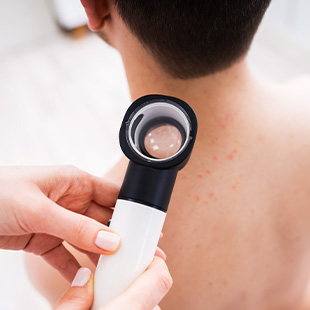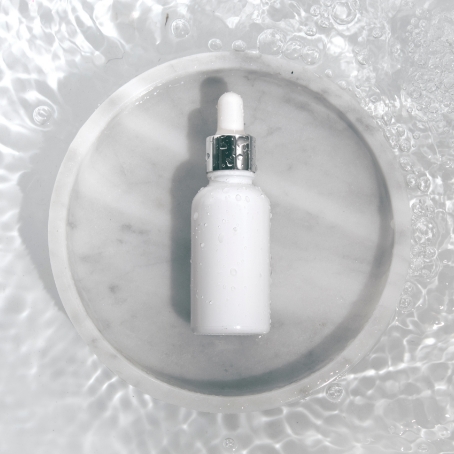On this page


While it does not indicate any threat to a patient’s health, melasma causes patches of abnormal pigmentation that may not fit into a person’s aesthetic ideals for his or her appearance. Fortunately, there are treatment options for this pigmentation issue.
What is Melasma?
Melasma, or chloasma, is a skin condition that involves uneven skin coloration. It results when melanocytes, or melanin-producing cells, form an excess of skin pigmentation. Causes include ultraviolet light exposure, genetics, and hormonal imbalances. The blue light emitted from LED screens, such as those of cell phones, televisions, and laptops, can contribute to melasma as well.
Melasma is most likely to form on skin that is frequently exposed to the sun. The forehead, nose, cheeks, upper lip, chin, neck, arms, and back are common areas affected by melasma. In many cases, our providers can diagnose melasma by examining the discolored skin.
What Are the Symptoms of Melasma?
Melasma is most recognizable by blotchy or freckle-like spots on both sides of the face that are darker than the rest of the skin. The spots may be tan, brown, or grayish. They are usually flat and don’t have texture. Melasma is often mistaken for other skin conditions but is generally harmless – it is not a sign of skin cancer. Melasma may seem to darken more noticeably in the summer or when exposed to more sunlight.
REAL PATIENT RESULTS
Visit our gallery to see the Biltmore Difference. We pride ourselves on consistently great results and it is our happy patients who are a true testament to our work.
VIEW BEFORE AND AFTER PHOTOS
Who Does Melasma Affect?
Genetics
A family history of melasma increases the likelihood that you will develop this skin condition. It is more common among those with darker skin tones than in those with lighter skin. If you spend significant time in the sun or tanning beds and/or live in a geographical area with stronger than average UV radiation, you are more likely to be affected by melasma.
Sex
Melasma is much more prevalent in women than in men. The probability of experiencing melasma is particularly high among women who are in their reproductive years, take hormones, and/or use oral contraceptives.
Pregnancy
Pregnancy is another factor that makes women more susceptible to developing melasma. This is thought to be related to the increased progesterone and estrogen hormones that accompany pregnancy. Melasma is commonly referred to as the “mask of pregnancy” since so many women experience this skin condition during pregnancy. Pregnancy-related melasma symptoms may dissipate after childbirth.
Medication
There are some types of medication that can contribute to a patient’s development of melasma. Anti-seizure medications have been connected to melasma formation.
Additionally, medications that cause phototoxicity, or sun-sensitivity, can trigger this skin condition. Sensitivity to sunlight is a side effect of some antibiotics, blood pressure medications, and retinoids. Stopping the medication may or may not clear the melasma symptoms.
Thyroid
Thyroid disorders can also make you more vulnerable to melasma. In some instances, correcting the thyroid issue also resolves the hyperpigmentation.
What Treatments Are Available For Melasma?
The course of treatment varies in relation to the patient’s skin tone, skin type, and other factors. The depth and severity of the hyperpigmentation is an important factor in determining a treatment approach as well. Our team can help you explore your best options with appropriate treatment package.
At Biltmore Dermatology in Terre Haute, melasma treatments can include one or more of the following interventions:
Topical Medications
Medicinal creams can be an effective intervention for some melasma cases. Prescription topical creams like hydroquinone and tretinoin can provide a skin-lightening effect. Regular use is required for noticeable results. These products can cause skin irritation, dryness, and/or redness, so prescription melasma creams may not be well-tolerated by patients with sensitive skin.
Chemical Peels
Chemical peels can help to even out the skin tone. VI peels are often Biltmore’s preferred chemical peel for patients with melasma.
Microneedling
To prevent melasma from recurring and to encourage and support optimal healing a microneedling procedure may be recommended. The tiny wounds created during this treatment stimulate the body’s healing process. Two or more microneedling sessions may be needed to best address melasma.
Red Led Light Therapy
The wavelengths of red LED light have anti-inflammatory benefits. This treatment helps to rejuvenate and heal skin cells, making this therapy a valuable complement to other melasma treatments.

WALK-IN APPOINTMENTS
If you have an immediate concern, you want to find quality care as soon as possible. Our office takes walk-in appointments and will be happy to address your concerns and offer you immediate treatment suggestions and medical care.
LEARN MOREManaging Melasma
The most important step in treating melasma is avoiding sunlight. Sun exposure can worsen pigmentation and even damage the skin if you’re using certain prescription-grade creams to treat it. Make sure to wear sunscreen daily with SPF 30+ and only use your prescribed products for as long as your certified dermatology provider instructs. Using certain pigmentation medications for longer than instructed can put your skin at risk.
Schedule a Consultation
Melasma can be stubborn but our team can help. To meet with our team, call our Terre Haute, IN office, fill out our online contact form, or “Walk In Now.”

RYAN T. PATTERSON FOUNDER/CEO, DCNP
Ryan is State Licensed and Nationally Board Certified as a Family Nurse Practitioner (NP-C) by the American Academy of Nurse Practitioners. Additionally, he is board certified as a Dermatology Certified Nurse Practitioner (DCNP) by the Dermatology Nursing Certification Board. He has 20+ years of Dermatology Experience.
Meet The TeamTestimonials
Testimonials

SHOP SKINCARE PRODUCTS
We rely on medical-grade skincare products with quality ingredients clinically proven to restore and maintain skin health. Find your perfect products and develop a customized skincare routine designed to your skin type and skin concerns.






